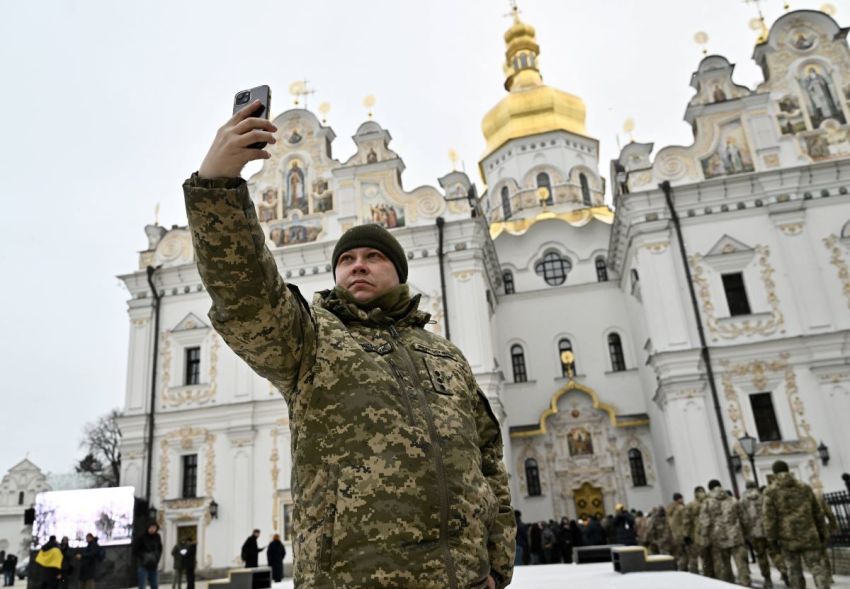Ukraine passes law banning Orthodox denomination with historic ties to Russia

Ukrainian lawmakers passed a law banning churches and religious groups with ties to Moscow as the war between Russia and Ukraine continues.
The Verkhovna Rada passed the bill on Tuesday, banning groups associated with the Russian Orthodox Church and the Ukrainian Orthodox Church, which has historic ties to the Moscow patriarch but severed those ties in May 2022 in opposition to the war.
Ukrainian leaders have maintained that the UOC is working as an arm of the Russian Orthodox Church, led by a patriarch who has called the invasion of Ukraine beginning in February 2022 a "holy" endeavor to bring the region under Russian control.
The ban would not apply to the Orthodox Church of Ukraine, officially recognized by most global Orthodox Church leadership in 2019 and independent of Russian influence.
Ukraine accuses the UOC of supporting the Russian invasion of Ukraine by spreading pro-Russian propaganda and has arrested clergy on what advocates have called false allegations of espionage.
"This is a historic vote. Parliament approved a legislation which bans a branch of the aggressor country in Ukraine," stated Ukrainian lawmaker Iryna Herashchenko, according to Reuters.
Ukrainian President Volodymyr Zelenskiy supported the bill, labeling it a step toward "spiritual independence."
The Ukrainian Council of Churches, which represents a majority of Ukrainian religious bodies, praised the law's passage.
"We support the legislative initiative of the President of Ukraine to make it impossible for such organizations to operate in our country, which also has broad political and public support," the council said in a statement.
"The main threat to religious freedom in Ukraine is the Russian aggression, as a result of which dozens of clergymen were killed by the occupiers and hundreds of churches and houses of worship were destroyed. The Moscow Patriarchate justifies pogroms and restrictions on religious freedom, torture and murders of priests and pastors, and cynically tramples on God's instructions and basic norms of universal morality."
Individual parishes will have at least nine months to decide whether to leave the UOC, notes Reuters.
Wesley J. Smith, chair of the Discovery Institute's Center on Human Exceptionalism, is among the critics of the new law, arguing that the measure violates the religious freedom of those who wish to remain with the UOC.
"The dispute about whether the Ukrainian Orthodox Church or the Orthodox Church of Ukraine legitimately represents Ukrainian Orthodoxy is a matter for the Orthodox Church to work out," wrote Smith for National Review.
"But the government of Ukraine should not decide which church is 'legitimate' and which is not, which can operate openly and which should be suppressed."
In May 2022, a few months after Russian forces invaded Ukraine, the UOC announced it was cutting ties with Moscow over the Russian Orthodox Church's support of the war.
"The council has approved the corresponding additions and changes to the Statute on the Management of the Ukrainian Orthodox Church, indicating the full autonomy and independence of the Ukrainian Orthodox Church," stated UOC leadership at the time.
Multiple allegations have surfaced of UOC-affiliated clergy and sites reportedly helping spread pro-Russian literature and sympathy for the invasion.
Ukraine had been considering legislation to ban the UOC and other Russian Orthodox-linked entities last October, with proponents arguing that it is a matter of protecting national security.
Russian Orthodox Church Patriarch Kirill, who has supported the invasion of Ukraine, denounced last year's vote as being done by "radical politicians."
"They do not hide the fact that the bill is directed against the largest religious community of Ukraine and is aimed at the liquidation of the Ukrainian Orthodox Church as a centralized structure with each of all its dioceses, parishes and monasteries and convents," Kirill said in a statement.



























